人教版(2019)选择性必修第一册:Unit 4 Body Language Words and expressions 课件(20张)
文档属性
| 名称 | 人教版(2019)选择性必修第一册:Unit 4 Body Language Words and expressions 课件(20张) |
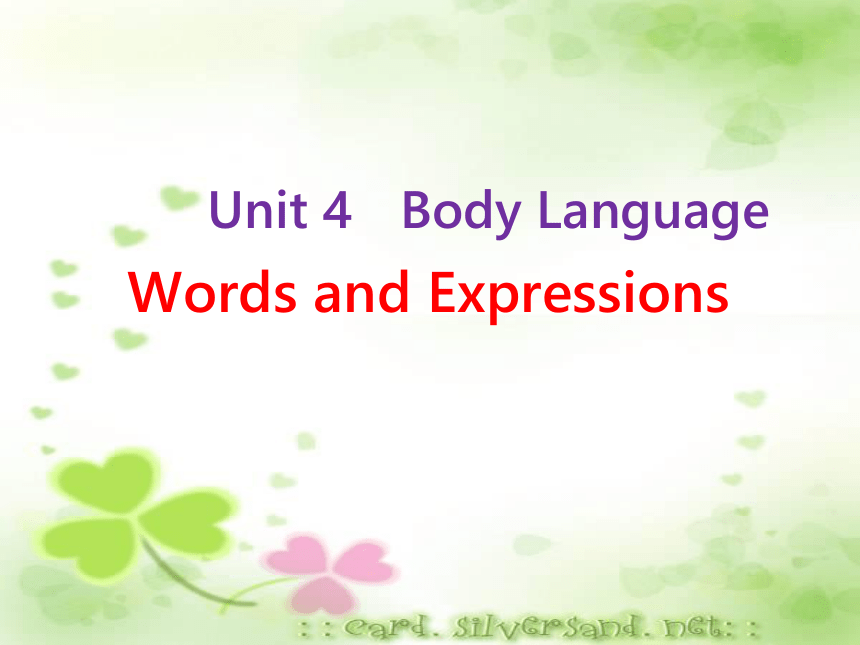
|
|
| 格式 | pptx | ||
| 文件大小 | 145.5KB | ||
| 资源类型 | 教案 | ||
| 版本资源 | 人教版(2019) | ||
| 科目 | 英语 | ||
| 更新时间 | 2021-10-31 00:00:00 | ||
图片预览

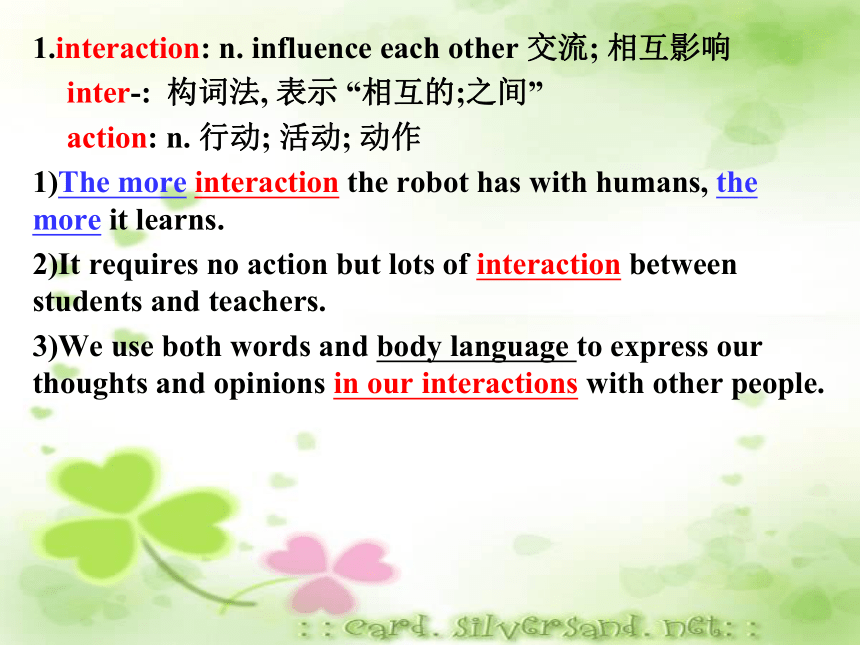
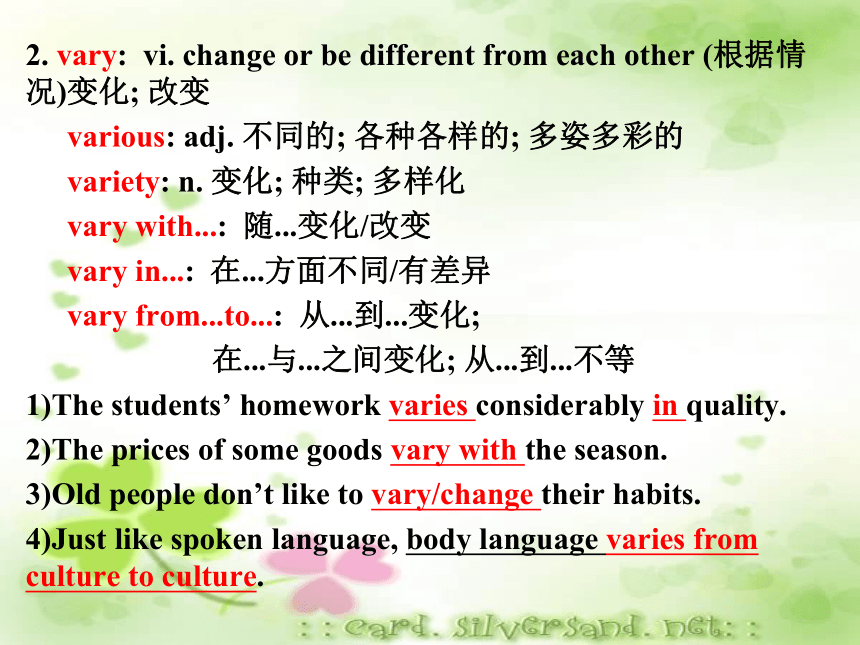
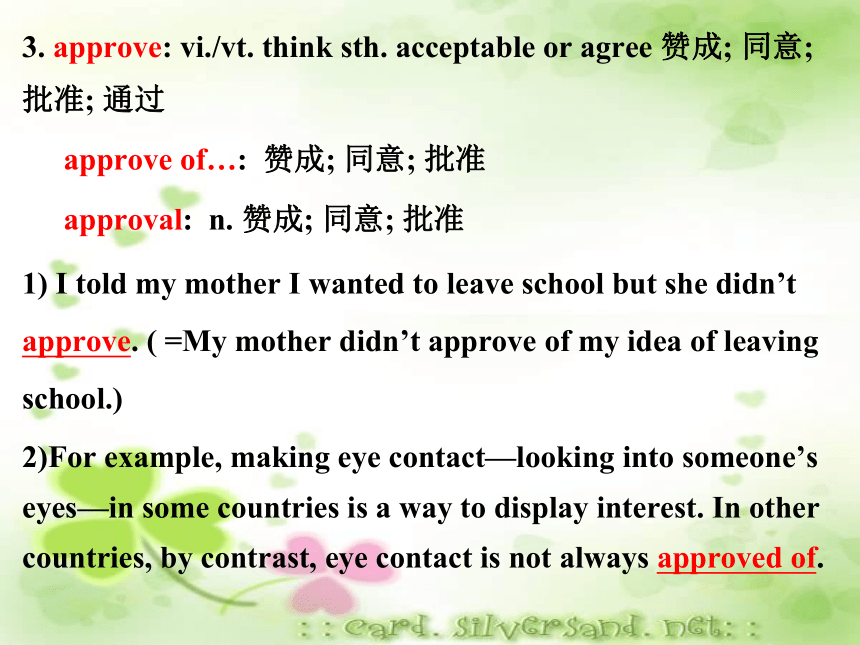
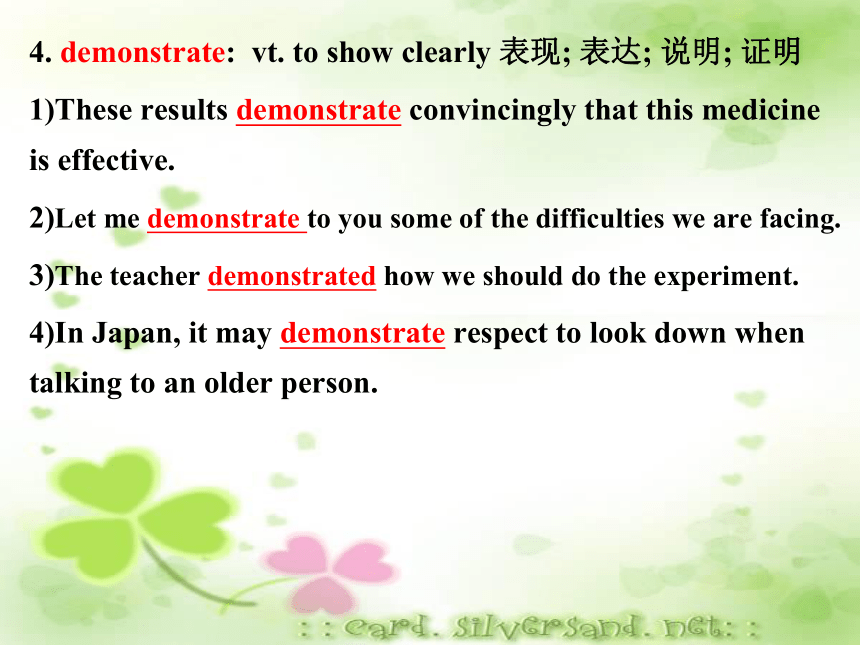
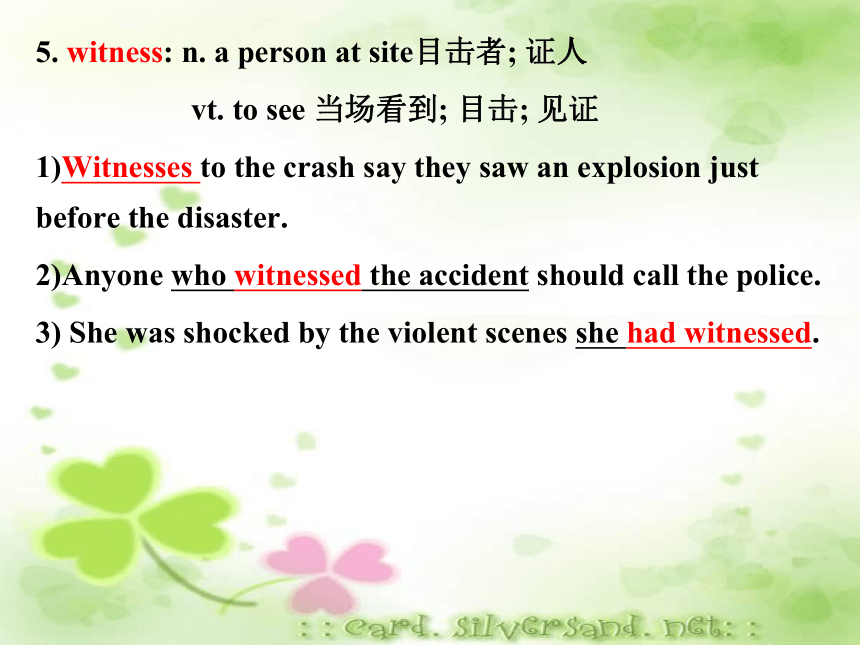
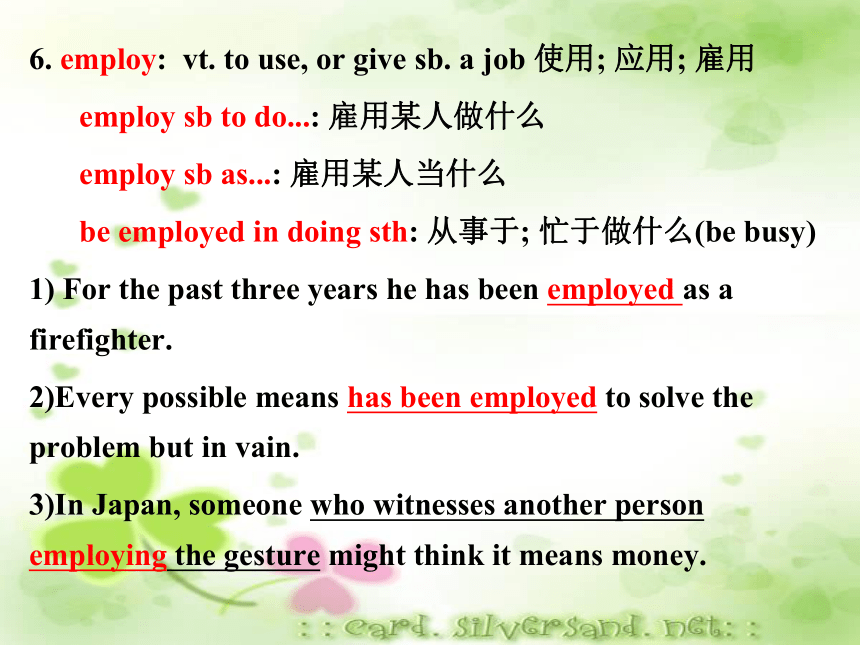
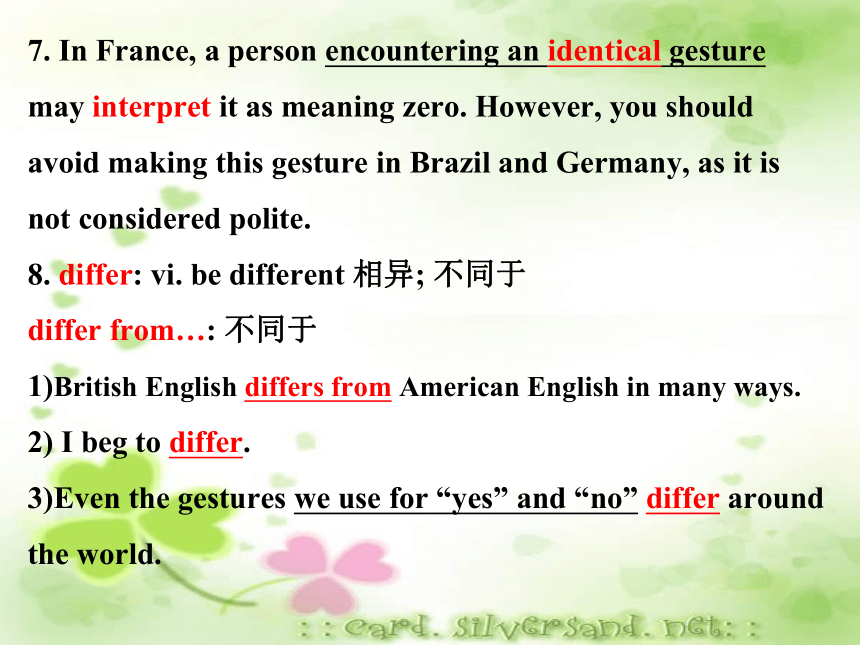
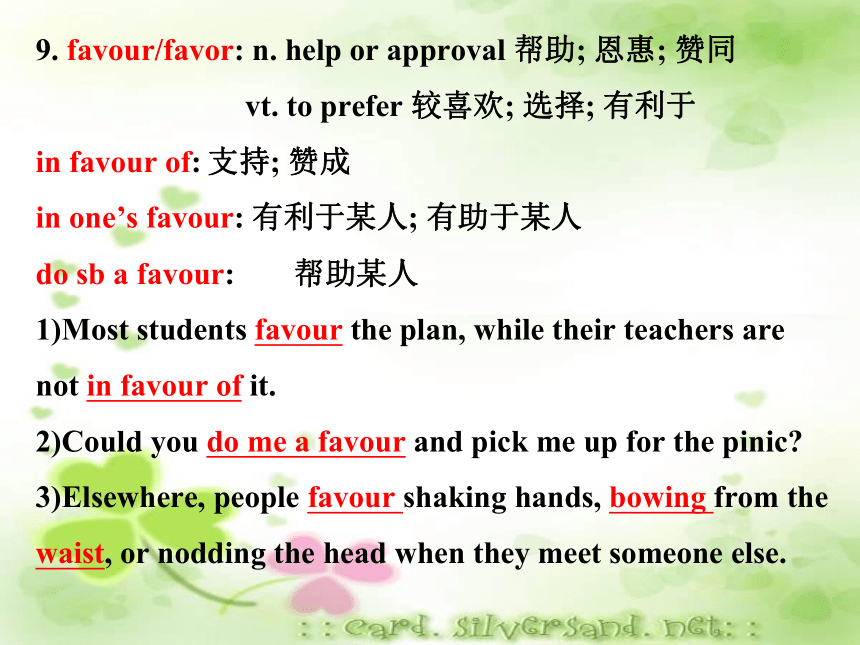
文档简介
(共20张PPT)
Unit 4 Body Language
Words and Expressions
1.interaction: n. influence each other 交流; 相互影响
inter-: 构词法, 表示 “相互的;之间”
action: n. 行动; 活动; 动作
1)The more interaction the robot has with humans, the more it learns.
2)It requires no action but lots of interaction between students and teachers.
3)We use both words and body language to express our thoughts and opinions in our interactions with other people.
2. vary: vi. change or be different from each other (根据情况)变化; 改变
various: adj. 不同的; 各种各样的; 多姿多彩的
variety: n. 变化; 种类; 多样化
vary with...: 随...变化/改变
vary in...: 在...方面不同/有差异
vary from...to...: 从...到...变化;
在...与...之间变化; 从...到...不等
1)The students’ homework varies considerably in quality.
2)The prices of some goods vary with the season.
3)Old people don’t like to vary/change their habits.
4)Just like spoken language, body language varies from culture to culture.
3. approve: vi./vt. think sth. acceptable or agree 赞成; 同意; 批准; 通过
approve of…: 赞成; 同意; 批准
approval: n. 赞成; 同意; 批准
1) I told my mother I wanted to leave school but she didn’t approve. ( =My mother didn’t approve of my idea of leaving school.)
2)For example, making eye contact—looking into someone’s eyes—in some countries is a way to display interest. In other countries, by contrast, eye contact is not always approved of.
4. demonstrate: vt. to show clearly 表现; 表达; 说明; 证明
1)These results demonstrate convincingly that this medicine is effective.
2)Let me demonstrate to you some of the difficulties we are facing.
3)The teacher demonstrated how we should do the experiment.
4)In Japan, it may demonstrate respect to look down when talking to an older person.
5. witness: n. a person at site目击者; 证人
vt. to see 当场看到; 目击; 见证
1)Witnesses to the crash say they saw an explosion just before the disaster.
2)Anyone who witnessed the accident should call the police.
3) She was shocked by the violent scenes she had witnessed.
6. employ: vt. to use, or give sb. a job 使用; 应用; 雇用
employ sb to do...: 雇用某人做什么
employ sb as...: 雇用某人当什么
be employed in doing sth: 从事于; 忙于做什么(be busy)
1) For the past three years he has been employed as a firefighter.
2)Every possible means has been employed to solve the problem but in vain.
3)In Japan, someone who witnesses another person employing the gesture might think it means money.
7. In France, a person encountering an identical gesture may interpret it as meaning zero. However, you should avoid making this gesture in Brazil and Germany, as it is not considered polite.
8. differ: vi. be different 相异; 不同于
differ from…: 不同于
1)British English differs from American English in many ways.
2) I beg to differ.
3)Even the gestures we use for “yes” and “no” differ around the world.
9. favour/favor: n. help or approval 帮助; 恩惠; 赞同
vt. to prefer 较喜欢; 选择; 有利于
in favour of: 支持; 赞成
in one’s favour: 有利于某人; 有助于某人
do sb a favour: 帮助某人
1)Most students favour the plan, while their teachers are not in favour of it.
2)Could you do me a favour and pick me up for the pinic
3)Elsewhere, people favour shaking hands, bowing from the waist, or nodding the head when they meet someone else.
10. reliable: adj. being trusted 可靠的; 可信赖的
rely: v. 依靠; 依赖; 信任
rely on/upon…: 依靠; 信赖
1)We are looking for someone who is reliable and hard-working.
2)Our information comes from a reliable source.
3)Which is a more reliable guide for understanding someone’s feelings, their body language or the words they speak
11. assess: vt. to jugde, evaluate or estimate评估; 评价
assessment: n. 评价; 评定
1)We are trying to assess how well the system works.
2)It’s difficult to assess the effects of the reform.
3)Damage to the building was assessed at $80,000.
4)They assess his house at 1,000 pounds.
5)What’s your assessment of our chances of winning the game
12. reveal: vt. to make sth. known 揭示; 显示; 露出
1)She laughed, revealing her white teeth.
2)He will never reveal his friends’ secrets.
3)The findings of the research reveals that appropriate exercise benefits sleeping.
4)Blood tests reveal that the old woman is in good health.
13. in other words: 换句话说; 也就是说
That is (to say). 也就是说; 即
in a/one word: 总之; 简言之
1)They asked him to leave --- in other words he was fired.
2)In other words, we make our own happiness.
3)In other words, she does not actually have the disease.
14. tendency: n. 趋势; 倾向
have a tendency to do...: 倾向于做..; 喜欢做...
1)He has a tendency to talk too much when he is drunk.
2)The price of oil has an upward/a downward tendency.
3)People have a tendency to lean towards whatever they are interested in.
15. imply:vt. to suggest 意味着; 暗示
1)Are you implying (that) I have failed the test
2)The news implied that the pilot was responsible for the accident.
3)What is implied in the researcher’s words
4)So if a student has his head lowered to look at his watch, it implies he is bored and just counting the minutes for the class to end.
16. occupy: vt. to fill or take up 占据; 占用(时间/空间)
occupation:n. 职业;占领;占用
be occupied with/in…: 忙于; 从事; 专心
1)During the war their lands were occupied by the enemy.
2)The large bed occupies most of the room.
3)The teaching work occupies half of my time.
4) With their chins on their hands, they occupy themselves by staring out of the window or up at the ceiling.
17. distinguish: vi./vt. 区分; 辨别
distinguished: adj. 著名的; 卓越的; 受人尊敬的
distinguish A from B/ between A and B: 辨别/区分出A和B
1) Sometimes reality and fantasy are hard to distinguish.
Sometimes it is hard to distinguish reality from fantasy.
Sometimes it is hard to distinguish between reality and fantasy.
2)Tu Youyou is known as a distinguished scientist.
3)While it is easy to perceive when students are interested, bored, or distracted, it is sometimes much harder to distinguish when students are troubled.
18. If a student does not bother to brush her hair and her eyes are red from weeping, then I can infer that there are deeper issues at work. It could be that she is having serious conflicts with other students ro at home. Whatever it is, I know I need to inquire and assess what is going on.
19. ultimately: adv. eventually, finally or in closing 最后; 最终 (常用于列举: firstly, ... secondely,... ultimately,...)
1)Ultimately, you’ll have to make the decision yourself.
2)Ultimately, my duty is helping every student to learn.
20. adjust: vt. to change to be suitable or get used to 调整; 调节; 适应; (使)习惯
adjust/adapt (oneself) to (介词)…: 适应
1)He has adjusted his schedule/plan because of the weather.
2)You’ll quickly adjust (yourself) to collge life.
3)It took her a long time to adjust to living alone.
21. react: vi. to respond or answer (对…)起反应; 回应; (对食物等)有不良反应
reaction: n. 反应; 回应; 生理反应
react to ...: 对...做出反应/回应
1)I waved at her but she didn’t react.
2)Local residents have reacted angrily to the news.
3) Some people can react badly to certain food.
4)Reacting to body language is an important component of being a teacher.
Unit 4 Body Language
Words and Expressions
1.interaction: n. influence each other 交流; 相互影响
inter-: 构词法, 表示 “相互的;之间”
action: n. 行动; 活动; 动作
1)The more interaction the robot has with humans, the more it learns.
2)It requires no action but lots of interaction between students and teachers.
3)We use both words and body language to express our thoughts and opinions in our interactions with other people.
2. vary: vi. change or be different from each other (根据情况)变化; 改变
various: adj. 不同的; 各种各样的; 多姿多彩的
variety: n. 变化; 种类; 多样化
vary with...: 随...变化/改变
vary in...: 在...方面不同/有差异
vary from...to...: 从...到...变化;
在...与...之间变化; 从...到...不等
1)The students’ homework varies considerably in quality.
2)The prices of some goods vary with the season.
3)Old people don’t like to vary/change their habits.
4)Just like spoken language, body language varies from culture to culture.
3. approve: vi./vt. think sth. acceptable or agree 赞成; 同意; 批准; 通过
approve of…: 赞成; 同意; 批准
approval: n. 赞成; 同意; 批准
1) I told my mother I wanted to leave school but she didn’t approve. ( =My mother didn’t approve of my idea of leaving school.)
2)For example, making eye contact—looking into someone’s eyes—in some countries is a way to display interest. In other countries, by contrast, eye contact is not always approved of.
4. demonstrate: vt. to show clearly 表现; 表达; 说明; 证明
1)These results demonstrate convincingly that this medicine is effective.
2)Let me demonstrate to you some of the difficulties we are facing.
3)The teacher demonstrated how we should do the experiment.
4)In Japan, it may demonstrate respect to look down when talking to an older person.
5. witness: n. a person at site目击者; 证人
vt. to see 当场看到; 目击; 见证
1)Witnesses to the crash say they saw an explosion just before the disaster.
2)Anyone who witnessed the accident should call the police.
3) She was shocked by the violent scenes she had witnessed.
6. employ: vt. to use, or give sb. a job 使用; 应用; 雇用
employ sb to do...: 雇用某人做什么
employ sb as...: 雇用某人当什么
be employed in doing sth: 从事于; 忙于做什么(be busy)
1) For the past three years he has been employed as a firefighter.
2)Every possible means has been employed to solve the problem but in vain.
3)In Japan, someone who witnesses another person employing the gesture might think it means money.
7. In France, a person encountering an identical gesture may interpret it as meaning zero. However, you should avoid making this gesture in Brazil and Germany, as it is not considered polite.
8. differ: vi. be different 相异; 不同于
differ from…: 不同于
1)British English differs from American English in many ways.
2) I beg to differ.
3)Even the gestures we use for “yes” and “no” differ around the world.
9. favour/favor: n. help or approval 帮助; 恩惠; 赞同
vt. to prefer 较喜欢; 选择; 有利于
in favour of: 支持; 赞成
in one’s favour: 有利于某人; 有助于某人
do sb a favour: 帮助某人
1)Most students favour the plan, while their teachers are not in favour of it.
2)Could you do me a favour and pick me up for the pinic
3)Elsewhere, people favour shaking hands, bowing from the waist, or nodding the head when they meet someone else.
10. reliable: adj. being trusted 可靠的; 可信赖的
rely: v. 依靠; 依赖; 信任
rely on/upon…: 依靠; 信赖
1)We are looking for someone who is reliable and hard-working.
2)Our information comes from a reliable source.
3)Which is a more reliable guide for understanding someone’s feelings, their body language or the words they speak
11. assess: vt. to jugde, evaluate or estimate评估; 评价
assessment: n. 评价; 评定
1)We are trying to assess how well the system works.
2)It’s difficult to assess the effects of the reform.
3)Damage to the building was assessed at $80,000.
4)They assess his house at 1,000 pounds.
5)What’s your assessment of our chances of winning the game
12. reveal: vt. to make sth. known 揭示; 显示; 露出
1)She laughed, revealing her white teeth.
2)He will never reveal his friends’ secrets.
3)The findings of the research reveals that appropriate exercise benefits sleeping.
4)Blood tests reveal that the old woman is in good health.
13. in other words: 换句话说; 也就是说
That is (to say). 也就是说; 即
in a/one word: 总之; 简言之
1)They asked him to leave --- in other words he was fired.
2)In other words, we make our own happiness.
3)In other words, she does not actually have the disease.
14. tendency: n. 趋势; 倾向
have a tendency to do...: 倾向于做..; 喜欢做...
1)He has a tendency to talk too much when he is drunk.
2)The price of oil has an upward/a downward tendency.
3)People have a tendency to lean towards whatever they are interested in.
15. imply:vt. to suggest 意味着; 暗示
1)Are you implying (that) I have failed the test
2)The news implied that the pilot was responsible for the accident.
3)What is implied in the researcher’s words
4)So if a student has his head lowered to look at his watch, it implies he is bored and just counting the minutes for the class to end.
16. occupy: vt. to fill or take up 占据; 占用(时间/空间)
occupation:n. 职业;占领;占用
be occupied with/in…: 忙于; 从事; 专心
1)During the war their lands were occupied by the enemy.
2)The large bed occupies most of the room.
3)The teaching work occupies half of my time.
4) With their chins on their hands, they occupy themselves by staring out of the window or up at the ceiling.
17. distinguish: vi./vt. 区分; 辨别
distinguished: adj. 著名的; 卓越的; 受人尊敬的
distinguish A from B/ between A and B: 辨别/区分出A和B
1) Sometimes reality and fantasy are hard to distinguish.
Sometimes it is hard to distinguish reality from fantasy.
Sometimes it is hard to distinguish between reality and fantasy.
2)Tu Youyou is known as a distinguished scientist.
3)While it is easy to perceive when students are interested, bored, or distracted, it is sometimes much harder to distinguish when students are troubled.
18. If a student does not bother to brush her hair and her eyes are red from weeping, then I can infer that there are deeper issues at work. It could be that she is having serious conflicts with other students ro at home. Whatever it is, I know I need to inquire and assess what is going on.
19. ultimately: adv. eventually, finally or in closing 最后; 最终 (常用于列举: firstly, ... secondely,... ultimately,...)
1)Ultimately, you’ll have to make the decision yourself.
2)Ultimately, my duty is helping every student to learn.
20. adjust: vt. to change to be suitable or get used to 调整; 调节; 适应; (使)习惯
adjust/adapt (oneself) to (介词)…: 适应
1)He has adjusted his schedule/plan because of the weather.
2)You’ll quickly adjust (yourself) to collge life.
3)It took her a long time to adjust to living alone.
21. react: vi. to respond or answer (对…)起反应; 回应; (对食物等)有不良反应
reaction: n. 反应; 回应; 生理反应
react to ...: 对...做出反应/回应
1)I waved at her but she didn’t react.
2)Local residents have reacted angrily to the news.
3) Some people can react badly to certain food.
4)Reacting to body language is an important component of being a teacher.
